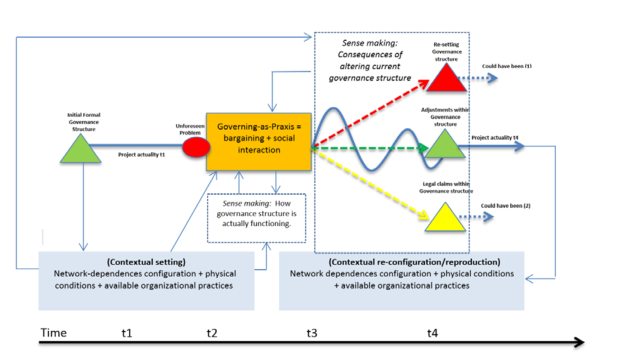Researcher: Camilo Benitez Avila
Project Duration: June 2015 – May 2019
Project Partner: Reset Management, Twynstra Gudde, RWS, Erasmus University
Project Description:
Existing Public-Private Partnerships (PPP) governance approaches rely on designing organizational structures and decision-making procedures, with the potential to trigger specific behaviors to successfully deal with disruptive events that might jeopardized its mission. These “project governance mechanisms” are defined in the front-end of PPP projects, having the expectation that negotiated configuration of commercial, hierarchical and collaborative relations guarantee collective efforts for creating value; regardless how the future unfolds at the implementation stage. Nevertheless, not having future any relation with the past or the present, commitment over initial governance configuration agreement is continually challenged. Particularly, when intervening actors consider that initial project assumptions cannot be longer held, and disruptive events compromise their initial expectations of value capture. Then, partners face new circumstances making use, altering or adjusting governance mechanisms in place. Current literature do not systematically account for specific use of governance mechanisms in the practices activated to face disruptive events, neither account for the path of project governing practices given the partners possibility to make legal claims, formally renegotiate ruling governance structure or informally adjust existing governance mechanisms. This research aims at developing a better understanding of the actual governing practices of PPP at implementation phase, and its dynamic nature of “PPP project governance mechanisms” over time.
The steering questions are: What governing mechanisms are used to deal with disruptive events in PPP projects at their operational and maintenance phase? What does explain the change or stability of PPP project governing practices overtime? This proposal introduces a model building-research strategy to answer this question, challenging current theoretical understandings of project governance while making use of Partial Squares Modeling, System Dynamics Modeling and empirical evidence from ethnographical research in a comparative case-study design. Insights into the governing practices are oriented to provide better understanding on how to deal with disruptive events at the PPP implementation phase, when these events are not clearly accounted by front-end governance organizational structures and decision-making procedure in place. Resulting insights will contribute to develop better PPP governance practices, and their conclusions are oriented to PPP practitioners, including PPP governance consultants, contract managers, PPP policy designers and PPP general managers.

